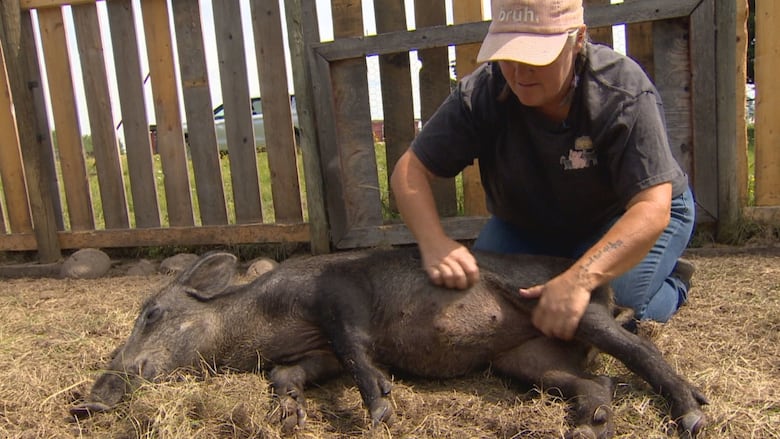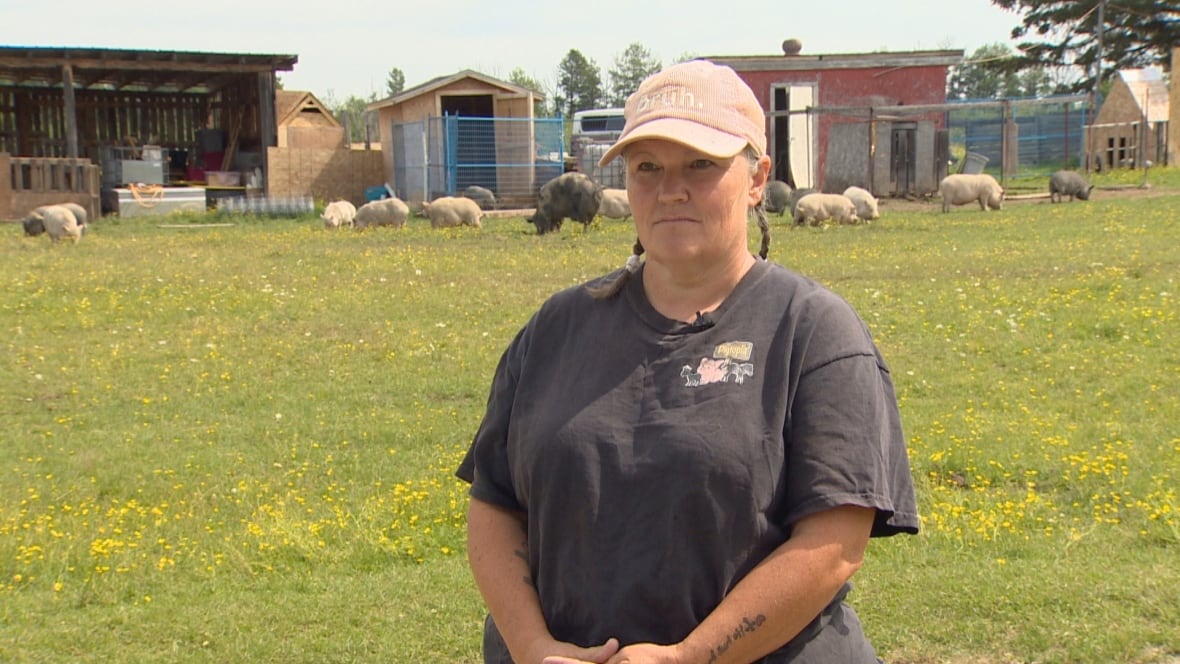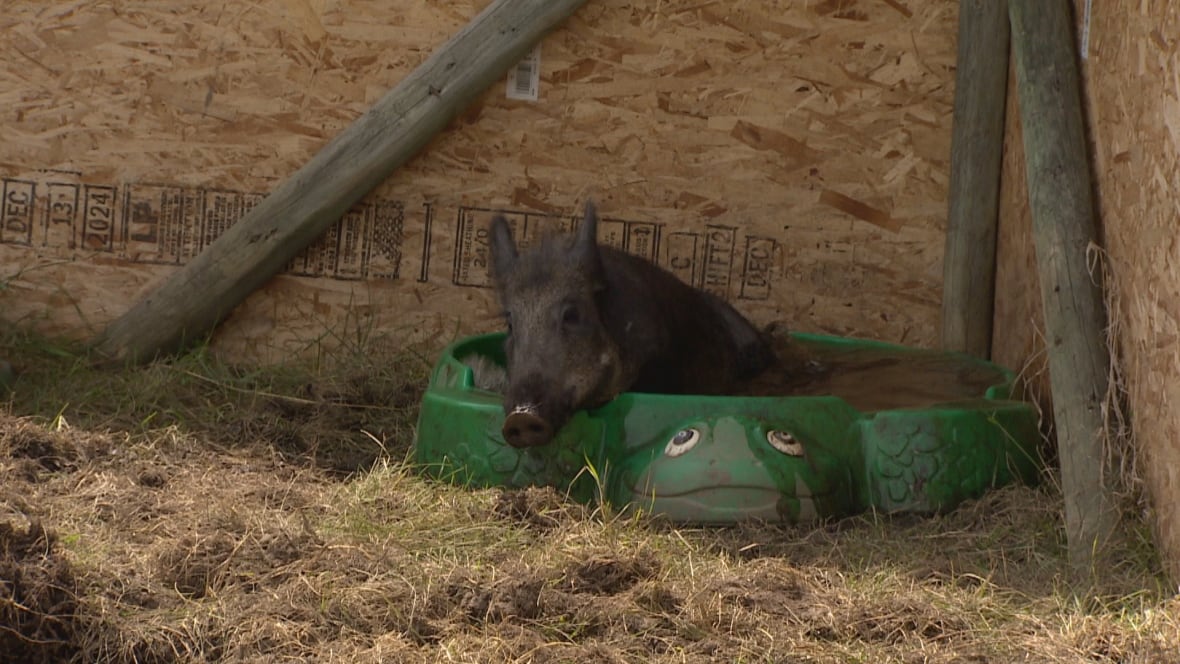Wild boar's future in jeopardy as Yellowhead County upholds pet prohibition bylaw
A rescue saved Wilber from a meat farm last year

Rosie's Rescue in Yellowhead County, Alta., is wrestling with a prohibited pets bylaw, so it can keep a wild boar.
The rescue's founder, Angela Pauls, rescued Wilber the wild boar� from a meat farm in Whitecourt, Alta., a town just outside the county, in March 2024. She said she didn't know what kind of pig it was at the time, but felt it was her duty to take him in anyway.
Wilber was a piglet at the time, suffering from a variety of serious health problems, including mange, pneumonia, dermatitis and a strep virus. At one point, he was put on an oxygen tank.
"Our vet had actually told us not to get her hopes up; that he probably wouldn't survive," Pauls said.
Wilber persevered, but he might not get to continue his comfortable life at the Rescue for much longer, after Pauls moved her non-profit in April from Leduc County, just south of Edmonton, to Yellowhead County, about 215 kilometres west of Edmonton.
Not like other boars
The county's council passed a bylaw more than six years ago that prohibits residents from keeping animals like wild boars as pets. Pauls said Leduc County did not have any similar bylaw.
When she learned about the bylaw after moving, Pauls wrote a letter to council, detailing Wilber's species and medical history. But council decided to uphold the bylaw.
"You also can look at a case on a case-by-case basis and say, 'You know what? Maybe he doesn't pose a threat,'" Pauls said.
"Whereas the wild boar farm that is in Yellowhead County, that produces wild boars … for meat, is a much bigger threat than what my boy would be."

Originally, council ordered Pauls to kill or remove the boar by the end of June. But they changed the requirement after an appeal, giving her six months to remove Wilber from the county.
The decision was made because wild boars are considered invasive in Alberta, Mayor Wade Williams told CBC News, adding that the council is policy-driven and is not making any exceptions.
Pauls finds that perplexing, though.
"I'm not a random resident here in the county. I am a registered not-for-profit," she said.
"We didn't go seeking this kind of pet. A rescue will help wherever it needs to help, and I don't think that [Wilber] should be discriminated against."
Pauls said Wilber poses no threat because he has been neutered, and is being kept in an enclosure he cannot escape.

But under the right conditions, wild boars can sow a messy web of destruction in the environments they live in, according to Megan Evans, executive director of the Alberta Invasive Species Council, a non-profit.
"They're quick to reproduce," she said.
Wild boars reach sexual maturity between six and 10 months old, Evans said. They can have two litters per year, and average six piglets per litter.
"That's almost an exponential population growth, if all of those pigs survive," she said.
A threat to Alberta's ecosystem
Wild boars check all the boxes of an invasive species, Evans said.
They are omnivores, thus can survive in most environments, she said. They can ruin crop fields, such as by turning them over to search for tubers and grubs, or eating growing crops, like corn.
In some cases, wild boards have been "really destructive" to native grasslands and the birds that live there, she said, noting that they'll turn over turf grass.
The animal is still relatively new to Alberta's ecosystem: they were introduced to the Prairies in the 1980s as a way to diversify agriculture.
According to the Agricultural Service Boards, Alberta has 13 wild boar farms.
"From an invasive species ecological perspective, the wild boar farms in Alberta are the source of our wild boar at large," Evans said.
Wild boars that go on the lam are one of the biggest reasons why the provincial government can't keep track of the animal's population.
Currently, it's up to municipalities to draft bylaws prohibiting the ownership of animals they consider to be pests. But in a statement, the Office of Agriculture and Irrigation Minister RJ Sigurdson told CBC News that the province would consider making changes to legislation at large regarding wild boars, after enough feedback and research.
"When at large, wild boar are an invasive, destructive pest that poses a serious risk for the introduction and spread of foreign animal diseases, which could have massive financial impacts for the entire livestock industry," the statement said.
In the meantime, Pauls is looking into legal avenues to keep Wilber by her side.
"If you sit down, he will lay down beside you. He wants you to rub his belly. He wants you to rub his feet," she said.
The fence of his enclosure is well over a metre tall, so he cannot jump over it, Pauls said. But he'll prop himself up and take treats gently from a person's hand.
"He's just so sweet, he really is," she said.
With files from Sarah Reid


